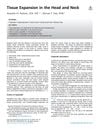 15 citations,
October 2016 in “Journal of The European Academy of Dermatology and Venereology”
15 citations,
October 2016 in “Journal of The European Academy of Dermatology and Venereology” People with hair loss have worse cholesterol levels, possibly linking hair loss to heart problems.
 15 citations,
October 2014 in “Hormone Molecular Biology and Clinical Investigation”
15 citations,
October 2014 in “Hormone Molecular Biology and Clinical Investigation” Some hair loss and prostate drugs might increase the risk of diabetes and heart disease.
 15 citations,
January 1988 in “Drugs”
15 citations,
January 1988 in “Drugs” The document concludes that treatments for female hair loss and excessive hair growth are temporary and not well-studied.
 14 citations,
December 2011 in “Archives of Dermatological Research”
14 citations,
December 2011 in “Archives of Dermatological Research” Phyto-vesicles of β-sitosterol may effectively treat hair loss.
 11 citations,
July 2017 in “Expert Opinion on Investigational Drugs”
11 citations,
July 2017 in “Expert Opinion on Investigational Drugs” New hair loss treatments may include topical medications, injections, and improved transplant methods.
 9 citations,
June 2019 in “Mycopathologia”
9 citations,
June 2019 in “Mycopathologia” Malassezia yeast linked to hair loss; ketoconazole helps treat it.
 8 citations,
April 2016 in “Anais Brasileiros De Dermatologia”
8 citations,
April 2016 in “Anais Brasileiros De Dermatologia” Right hand finger ratio may predict male hair loss.
 8 citations,
July 2012 in “Cambridge University Press eBooks”
8 citations,
July 2012 in “Cambridge University Press eBooks” Androgens can both increase body hair and cause scalp hair loss.
 5 citations,
July 2019 in “Atlas of the Oral and Maxillofacial Surgery Clinics”
5 citations,
July 2019 in “Atlas of the Oral and Maxillofacial Surgery Clinics” Tissue expansion for head and neck reconstruction has good blood supply and doesn't need capsule removal, but expect temporary hair loss with normal growth resuming after 6-8 months.
 5 citations,
November 2012 in “The Journal of Urology”
5 citations,
November 2012 in “The Journal of Urology” Early hair loss may indicate future prostate issues.
 4 citations,
April 2021 in “Journal of Cosmetic Dermatology”
4 citations,
April 2021 in “Journal of Cosmetic Dermatology” Botulinum toxin may help hair loss by increasing blood flow and reducing harmful factors.
 4 citations,
February 2019 in “Biological Trace Element Research”
4 citations,
February 2019 in “Biological Trace Element Research” Chromium salts may help with insulin sensitivity in PCOS, but more research is needed to confirm their overall effectiveness and safety.
 4 citations,
April 2016 in “Experimental Dermatology”
4 citations,
April 2016 in “Experimental Dermatology” AGA causes hair loss through follicle miniaturization and hair cycle changes; regrowth depends on anagen initiation in kenogen follicles.
 4 citations,
May 2014 in “European Journal of Dermatology”
4 citations,
May 2014 in “European Journal of Dermatology” Severe hair loss links to metabolic issues in older men with psoriasis.
 4 citations,
November 2009 in “Medical Clinics of North America”
4 citations,
November 2009 in “Medical Clinics of North America” Stress, nutritional issues, and chronic diseases can cause hair loss, and nail changes may signal internal diseases; treatment focuses on the underlying cause.
 3 citations,
June 2006 in “Expert Review of Dermatology”
3 citations,
June 2006 in “Expert Review of Dermatology” The document concludes that hair loss is complex, affects many people, has limited treatments, and requires more research on its causes and psychological impact.
2 citations,
June 2022 in “International Journal of Molecular Sciences” Lower levels of certain genes in hair cells improve hair loss treatment outcomes.
 1 citations,
August 2023 in “Curēus”
1 citations,
August 2023 in “Curēus” Metformin helps reduce PCOS-related infertility by improving insulin sensitivity and inducing ovulation.
 1 citations,
January 2020 in “Skin appendage disorders”
1 citations,
January 2020 in “Skin appendage disorders” Finasteride is safe for hair loss treatment and doesn't increase high-grade prostate cancer risk.
 1 citations,
November 2011 in “Archives of Dermatology”
1 citations,
November 2011 in “Archives of Dermatology” A woman's hair loss was caused by her husband's testosterone gel and a diabetic man's nail disease led to bone infection, both treated successfully.
 August 2024 in “Skin Research and Technology”
August 2024 in “Skin Research and Technology” PRP is an effective and safe treatment for female hair loss.
 July 2024 in “Clinical Cosmetic and Investigational Dermatology”
July 2024 in “Clinical Cosmetic and Investigational Dermatology” Certain immune cells are linked to non-scarring hair loss, suggesting potential for immune-targeted treatments.
 May 2024 in “FEBS open bio”
May 2024 in “FEBS open bio” Annurca apple extract may help treat hair loss and protect against oxidative stress.
 February 2024 in “Biomedicines”
February 2024 in “Biomedicines” Hormones like androgens, estrogen, thyroid hormones, and stress hormones can contribute to hair loss, and treatments target these hormonal imbalances.
 December 2023 in “International journal of drug delivery technology”
December 2023 in “International journal of drug delivery technology” The polyherbal hair serum helped prevent hair loss and improved hair growth better than the usual treatment.
 November 2023 in “Curēus”
November 2023 in “Curēus” Melatonin may help manage PCOS by improving insulin sensitivity, hormone balance, and mood.
 November 2023 in “International Journal For Multidisciplinary Research”
November 2023 in “International Journal For Multidisciplinary Research” Herbal hair oil made with natural ingredients helps reduce hair loss, dandruff, and graying.
 October 2023 in “Journal of Preventive Diagnostic and Treatment Strategies in Medicine”
October 2023 in “Journal of Preventive Diagnostic and Treatment Strategies in Medicine” Low ferritin and Vitamin D levels may cause hair loss after COVID-19.
 July 2023 in “Dermatology practical & conceptual”
July 2023 in “Dermatology practical & conceptual” Women with Female Pattern Hair Loss may experience more stress, anxiety, and depression, and have lower levels of BDNF, which could predict the psychological impact.
 January 2022 in “Indian journal of dermatopathology and diagnostic dermatology”
January 2022 in “Indian journal of dermatopathology and diagnostic dermatology” Women with diffuse hair loss often have lower iron and vitamin D levels, but their thyroid function is typically normal.





























